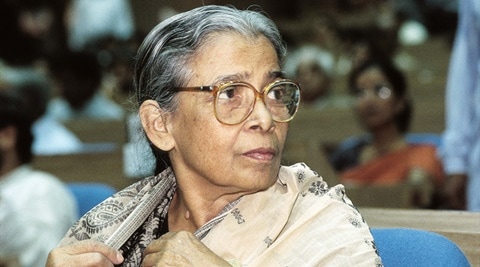Opinion Conscience keeper
Mahasweta Devi’s work forcefully reminded the mainstream of the losers of history.
 INDIA - MARCH 28: Mahasweta Devi, Woman Writer and Magasaysay Award Winner ( Books, Portrait ) (Photo by Dilip Banerjee/The India Today Group/Getty Images)
INDIA - MARCH 28: Mahasweta Devi, Woman Writer and Magasaysay Award Winner ( Books, Portrait ) (Photo by Dilip Banerjee/The India Today Group/Getty Images) A compelling voice of conscience has fallen silent. Among the lakhs of people who are mourning Mahasweta Devi today, the majority have never read her, because they are unlettered. But in no small measure, they owe their social standing to her work, which foregrounded races marginalised by centuries of colonial and developmental history. Devi spent over three decades working among India’s poor. Her attention was focused on the tribals, and she was instrumental in bringing the plight of tribes notified by the Raj to the notice of the civilised world.
At the same time, Devi was vocal in the agitations in Singur and Nandigram, speaking on behalf of peasants fighting against a modern force of marginalisation, the appropriation of land by the state. Her most celebrated novel, Mother of 1084, is set in the Naxalite movement, which began as a rural revolt in north Bengal but struck a flame among Kolkata’s youth, who were sickened by extreme inequality, the organising principle of feudal Indian society. Dispossession and agitation, which inform Indian politics in their many forms, were the themes that formed the backbone of her work, both literary and political.
Mahasweta Devi was one of the last of the old school of public intellectuals, writers who are instinctively political, who find it only natural to put aside the pen for a bit, roll up their sleeves and wade into the thick of it. For her, the worlds of action and reflection were two halves of the circle of life. If Western readers imagine that all Indian writers are simultaneously storytellers and streetfighters, much of the credit must go to Mahasweta Devi. Authors of that sadly dwindling clan, the conscience keepers of the human race, are desperately needed to caution the world against the costs of development.




